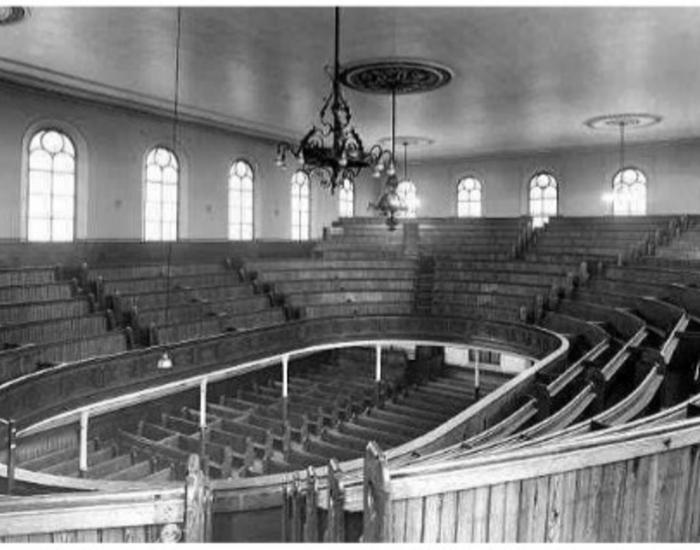Before Broadway
1839
In 1839, despite a serious recession in the UK, £11,000 is raised (around £900k in today’s money) to build a new and splendid Wesleyan chapel on Broad Street that can hold 1,900 people.
1844
Once completed, the new chapel proves popular. One attendee, former pawnbroker’s apprentice William Booth, is converted during the visit of the American evangelist Rev. James Caughey in 1844 and goes on to found the Salvation Army. A brass plaque commemorating William Booth can be found in our foyer.
1909
The chapel is thriving and a magnificent new organ is commissioned from the makers Norman and Beard. Time passes and the building becomes a landmark in the city. During the inter-war years, the chapel’s Sunday School and Boys’ Brigade flourish.

1941
As a side-effect of World War II, the basement is taken over by Nottingham Council in 1941 to be a British restaurant to feed the people.
1943
The Midland Group of Designers and Artists is formed in the city to promote local creative work. This will prove to be one of Broadway’s grandparents.
1947
Post-war, the chapel’s congregation is confronted with the cost of a new roof in 1947 and not a great deal of money to pay for it. Nottingham and District Film Society is formed to promote the study and appreciation of film - another Broadway grandparent is born.
1954
Gradually dwindling numbers lead to the closure of the chapel in 1954. But a new life is about to begin…
1959
After major redevelopment, the building re-opens in 1959 as the Co-operative Education Centre with an auditorium for music and cinema, and a dance hall, the legendary Rainbow Rooms, hosting bands and touring jazz artists from the USA. The organ goes to the Great Hall at the University of Nottingham, where it remains to this day. The newly established Nottingham Film Society shows international and archive films every month, and begins discussions with the British Film Institute (BFI) about gaining official status.
1962
The Rainbow Rooms hosts bands and touring jazz artists from the USA through the ‘50s and into the ‘60s. The Beatles are booked in 1962 but pull out when ‘Love Me Do’ hits the charts. Our Café Bar now sits where The Rainbow Rooms once were.
1966
On 22 September 1966, Nottingham Film Theatre opens its doors to the public – one of the first BFI-supported Regional Film Theatres in the country, screening films three days a month. This too is one of Broadway’s parents.
1975
In 1975, The New Cinema Workshop is created, a local film cooperative with a vision for the shared accessibility of filmmaking, from scripts to exhibition… one of Broadway’s aunts.
1980
In the Thatcher era, an association of filmmakers in the city, using a Government job-creation scheme, set up Nottingham Video Project, doing skills training and low-budget production for socially and politically aware organisations - another of Broadway’s aunts.
1985
In 1985, a consortium consisting of Nottingham Film Theatre, New Cinema Workshop, Midland Group, CODA and the Nottingham Video Project, together with several members of the city’s film community, successfully propose to the BFI that the city should be included in its emergent national Media Centre network. The ideal that would later become Broadway is born.
1987
Following the collapse of the Midland Group in 1987, the New Cinema Workshop and Nottingham Film Theatre come together to seek to secure the continuation and growth of cultural cinema in the city. This merger forms City Lights, which becomes a full-time cinema programme at the Co-operative Education Centre, and begins the search for new premises to establish a more ambitious Media Centre.
1990
After much searching and fundraising, the Nottingham Media Consortium buys the Co-operative Education Centre, and on 31 August 1990, Broadway is born.
